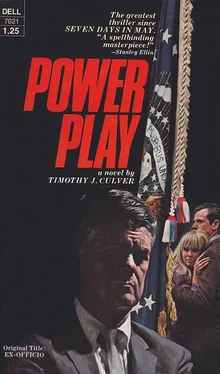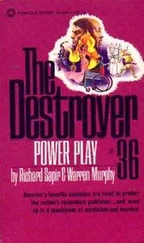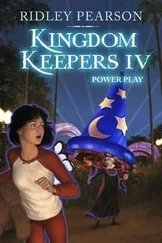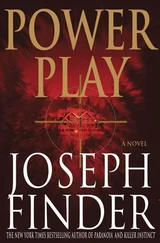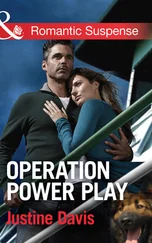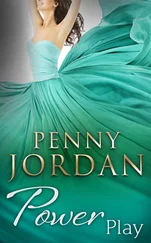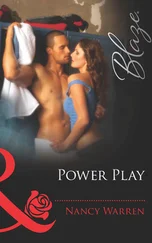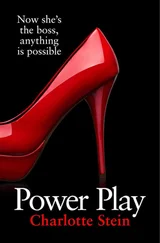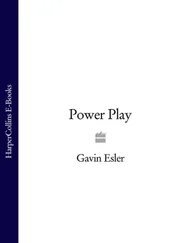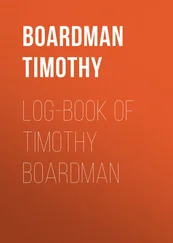Timothy Culver - Power Play
Здесь есть возможность читать онлайн «Timothy Culver - Power Play» весь текст электронной книги совершенно бесплатно (целиком полную версию без сокращений). В некоторых случаях можно слушать аудио, скачать через торрент в формате fb2 и присутствует краткое содержание. Город: New York, Год выпуска: 1971, ISBN: 1971, Издательство: Dell Books, Жанр: roman, на английском языке. Описание произведения, (предисловие) а так же отзывы посетителей доступны на портале библиотеки ЛибКат.
- Название:Power Play
- Автор:
- Издательство:Dell Books
- Жанр:
- Год:1971
- Город:New York
- ISBN:978-0440070214
- Рейтинг книги:5 / 5. Голосов: 1
-
Избранное:Добавить в избранное
- Отзывы:
-
Ваша оценка:
- 100
- 1
- 2
- 3
- 4
- 5
Power Play: краткое содержание, описание и аннотация
Предлагаем к чтению аннотацию, описание, краткое содержание или предисловие (зависит от того, что написал сам автор книги «Power Play»). Если вы не нашли необходимую информацию о книге — напишите в комментариях, мы постараемся отыскать её.
Occupation: Former President of the United States
Problem: Obsessive desire for power.
Loved and hated more than any man on earth, commanding absolute loyalty from the men and women who once had served him, defying the government he once had headed, Bradford Lockridge pursued his final and possibly insane vision of glory...
Power Play — читать онлайн бесплатно полную книгу (весь текст) целиком
Ниже представлен текст книги, разбитый по страницам. Система сохранения места последней прочитанной страницы, позволяет с удобством читать онлайн бесплатно книгу «Power Play», без необходимости каждый раз заново искать на чём Вы остановились. Поставьте закладку, и сможете в любой момент перейти на страницу, на которой закончили чтение.
Интервал:
Закладка:
iv
Was there to be only the one attempt? Wellington was growing increasingly nervous as each stage of the funeral passed with no further trouble. They had come to the church, and James Fanshaw and Joe Holt were both outside and in the proper places, the sign that everything was all right within. The ceremony, twenty-five minutes long, had droned to an end without an interruption, as had the procession from church to cemetery. Near the cemetery entrance, Eugene White and Mortimer Wellington signaled by their presence that here too everything was as it should be.
Beforehand, Wellington had believed the time of the burial would be the most dangerous of all. Bradford would of necessity be out of the car then, the cemetery was rolling open land, a grab here would be extremely difficult to deal with. But the time came, Elizabeth was put in the ground, and nothing happened.
And now the final leg, down the road along the river, through town, back to the house. Three cars of outriders led and flanked the cortege now: the Wellington brothers in one car, Fanshaw and Holt in a second, Eugene White and Mortimer Wellington in the third.
Four blocks from the house, Wellington spoke into his transmitter: “Six.” That was Earl Chatham. “We’re approaching.” That was the signal for Earl to leave the house and walk a block and a half to a certain intersection. His presence there would indicate there was no trouble in the house.
After a moment, the small voice in Wellington’s ear said, “He hasn’t emerged.”
Wellington frowned. Would there really be trouble at the house? He’d assigned that post to Earl Chatham, a willing but ineffectual man, because it was the least likely place for any kind of ambush.
Of course, it could simply be that Chatham’s receiver wasn’t working properly, or that he’d taken it out of his ear for a while because it itched or something. But Wellington wouldn’t take a chance; he waited until he could see ahead to the intersection, see that Chatham wasn’t there, and then he said into the transmitter, “Seven.” That was Albert Bloor, in the first car. “Circle.”
Bloor, three cars ahead, heard and understood the message. He leaned forward and said to the driver, “Go around the block, please.” As he understood it, Wellington had prepared the driver of the lead car for this eventuality; in fact, the driver was one of Wellington’s men. And now that the hearse and flower car were no longer with them, he was at the head of the line.
They did not make the turn they were supposed to make. They kept going straight ahead.
Wellington spoke again into the transmitter: “Three.” Fanshaw and Holt. “Four.” Wellington brothers. “Five.” Eugene White and Mortimer Wellington. “No reaction from Chatham at the house. Check it. Three in the back way, four and five in the front.”
The three automobiles, widely scattered around the general area of the cortege, all turned at once toward Sterling’s house, arriving almost simultaneously. James Fanshaw and Joseph Holt went around to the rear of the house and in through the solarium, while the three Wellingtons and Eugene White went in the front. All were men in their forties and fifties, but all were healthy, fairly active types, only Mortimer Wellington among them being very much overweight.
The three young men in Elizabeth’s bedroom saw the six men arrive, and they didn’t like it. One of them said, “We’d better get out of here.”
The leader was trying to remember about fingerprints; what had he touched, what was the likelihood of being able to wipe every fingerprint away? He said, “We stay here until we get Bradford Lockridge. We need him now more than ever.”
“Why?”
He turned on them, his fear transposing itself into fury. “Because we’re going to need asylum now. We killed that guy; you think they won’t get onto us? We’ve got to get out of this country, and that means China, and that means we need Lockridge. Because if we give them Lockridge they’ll be happy about us, and they’ll give us asylum.”
The second one said, “I don’t want to go to China .”
“It’s better than jail. Better than jail for the rest of your life. We have to hide somewhere. We’ll be able to move around again when the house is crowded.” Then we’ll get Lockridge and get out of here, same as we planned.”
Downstairs, Fanshaw and Holt and White and the three Wellingtons had finished checking out the first floor, and the credentials of the caterer’s men. They then asked the caterer’s men to join them while they looked the house over for a suspected burglar. The caterer’s men, while dressed as waiters, were all burly men, used to carrying heavy cases of food and drink, used to performing occasionally as bouncers. The six family members split up, each taking two of the caterer’s men along, and they proceeded to search the rest of the house, the Wellington brothers taking the basement and the other four going on up to the second floor.
They found all three young men fairly quickly. One tried to plead his way out and was ignored. One tried to run his way out and was caught by the caterer’s men. And the leader tried to bluff and bluster his way out and got his face slapped by Joseph Holt.
They had the three in the upstairs hall when Mortimer Wellington came out of Elizabeth’s bedroom, a drawn look on his round face. He was holding his right hand out away from himself, and it was smeared with reddish-brown. “We’d better call the police,” he said. “They’ve killed Earl.”
v
Neither Sterling nor Bradford was told about Earl. The cortege continued to drive around for fifteen minutes, while things were briskly taken care of in the house. The local police came and took away the three young men and the body. They moved with more speed and fewer questions than they might have, except that Wellington’s department had been in touch with their chief; they understood they were involved on the periphery of something hush-hush in connection with national security, but they didn’t know — and didn’t expect to know — exactly what. The last young man, waiting in the motorboat, was not discovered. He stayed where he was until dark when, certain by then that something had gone wrong, he drove the boat across the river and walked up route 14 to Millersburg, where at a gas station he got a lift back south again to Harrisburg. From Harrisburg he took a late bus east to Philadelphia, then the train to New York and another train out to Babylon, Long Island, arriving at ten the next morning. His parents were delighted at the fact of his return home, the change in his appearance, and his newly subdued manner. Two days later he was picked up and transported back to Lancashire to be charged as an accessory in the murder of Earl Chatham.
Once the house had been cleared of the young men and their victim, Eugene White walked out and down a block and a half, standing at the corner until the cortege came by, facing the other way during the passage of the car containing Bradford, nodding to Wellington two cars later, and then going on back to the house.
Wellington said, into the transmitter, “Seven. To the house.”
In the lead car, Albert Bloor leaned forward and said to the driver, “We’ll go to the house now.”
“Yes, sir.”
Five minutes later, the cars were emptying in front of Sterling’s house. The family members went slowly inside, Bradford at all times in the center of a large group, and just inside the door Joseph Holt took Wellington to one side and said, “Three of them were in here. They killed Earl.”
Wellington frowned, truly shocked. “They killed him?”
“Hit him with a lamp. I suppose they were afraid he’d give the alarm.”
Читать дальшеИнтервал:
Закладка:
Похожие книги на «Power Play»
Представляем Вашему вниманию похожие книги на «Power Play» списком для выбора. Мы отобрали схожую по названию и смыслу литературу в надежде предоставить читателям больше вариантов отыскать новые, интересные, ещё непрочитанные произведения.
Обсуждение, отзывы о книге «Power Play» и просто собственные мнения читателей. Оставьте ваши комментарии, напишите, что Вы думаете о произведении, его смысле или главных героях. Укажите что конкретно понравилось, а что нет, и почему Вы так считаете.
